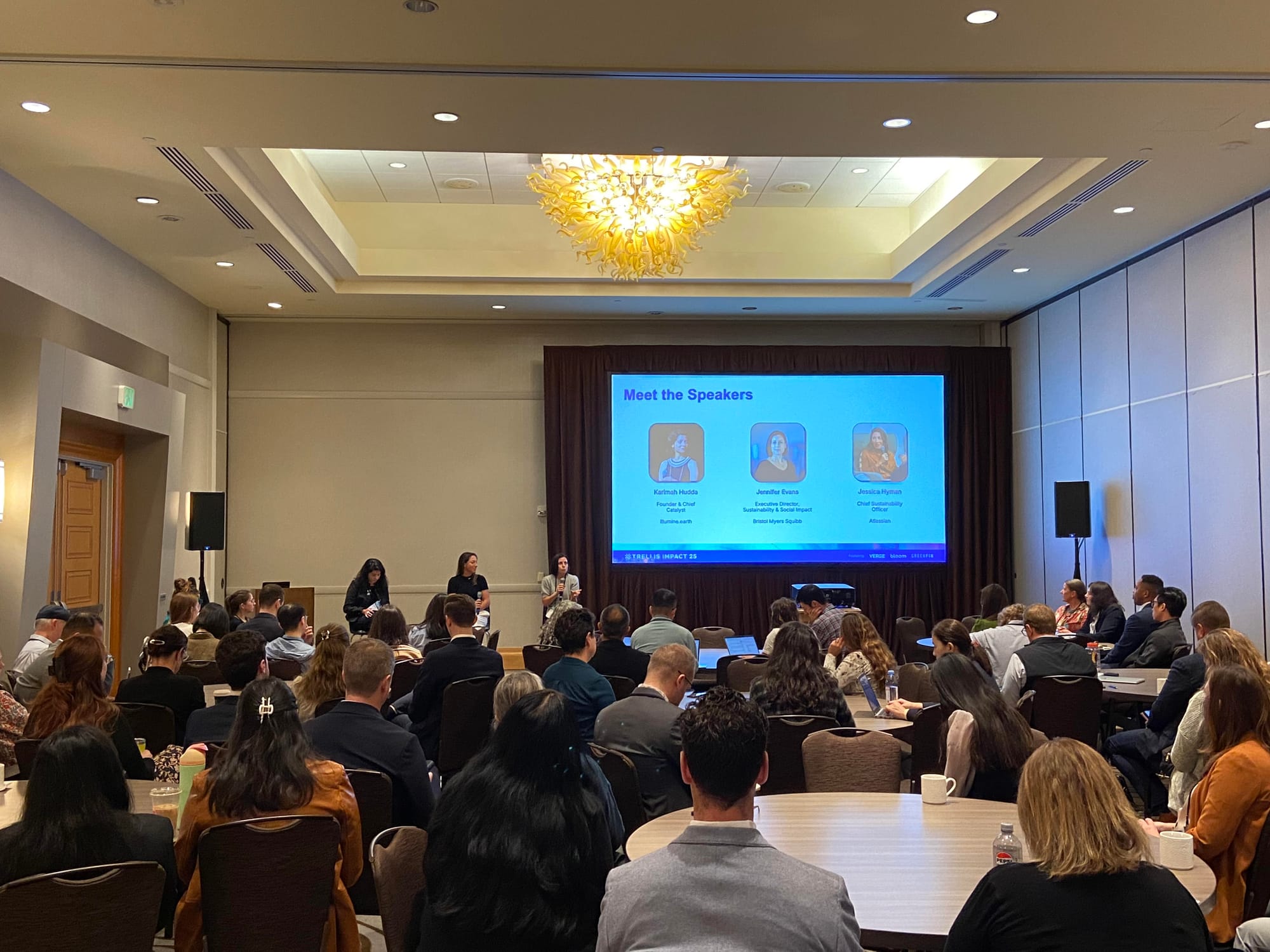How Can CSOs Improve Communication With CFOs?
To reach sustainability goals, CSOs need to speak the language of CFOs, which involves using data to quantify the business value that sustainability drives.

In an ideal world, sustainability leaders would have unlimited budget to achieve their desired impact. But reality demands otherwise in a capitalist society.
Corporate sustainability, by definition, requires a balance of environmental, social, and economic factors. If a company pursues environmental and social goals at all costs, that can create an unsustainable corporate environment, where there's not enough margin to support growing labor costs, R&D expenditures, etc.
While some companies have more leeway than others to pursue moral initiatives, that can be hard to justify for any organization that's not a non-profit. Otherwise, where do you draw the line between putting more money toward sustainability vs. trying to grow earnings?
For many chief sustainability officers (CSOs) and other sustainability leaders, that line is set by CFOs.
Yet sustainability doesn't have to be a profitability vs. charitability battle. Instead, sustainability can support financial goals. Getting there, however, typically requires CSOs to understand how to communicate effectively with CFOs.
At the Trellis Impact conference in October, two sustainability leaders — Jennifer Evans, executive director, sustainability & social impact at Bristol Myers Squibb, and Jessica Hyman, chief sustainability officer at Atlassian — discussed how to speak the CFO's language more effectively. This typically involves a more data-driven approach and understanding what metrics matter most to CFOs and the business overall.
Quantifying Impact
To get budget for sustainability investments, sustainability professionals need to quantify the impact. A broad, storytelling approach might work to get the marketing team on board for a given campaign, for example, but finance professionals deal in numbers.
"The CFO's language is data," said Evans. "It is investor-grade, audit-ready data. It is controls — making sure that we have the right controls and testing those controls. And it is the ROI."
In other words, sustainability professionals need to be able to present clear, quantifiable data that can be used to prove the value of sustainability investments, such as from a compliance standpoint (like avoided fines), financial risk management (like showing how renewable energy investments protect against energy price spikes), or revenue generation (like showing how sustainable-labeled products outsold general ones).
But while speaking in data can overcome CSO-CFO language barriers, it also matters what you say, not just how you say it.
Understanding What Matters to CFOs
Ultimately, the data that a CFO wants to see varies by company. A small business might be more focused on getting its products in more stores, while a large publicly traded company might be more focused on compliance and investor relations. Sustainability could support any of these areas, but it's up to sustainability leaders to prove the connections.
When Hyman first joined Atlassian, she went to the CFO and told him that "sustainability is not nice to have. This is a prerequisite for doing business. And his response to me was: 'Prove it. What data can you use to back that up and to be prepared to come with that,'" she explained.
However, before making the data connections, CSOs and CFOs may need to have a conversation about priorities. Hyman initially made assumptions about what her CFO cared about, but ended up going down the wrong path.
"I figured, okay, the CFO's got investor relations reporting into him. Surely the thing he will be motivated by is investor demand for [sustainability] progress," she said.
However, that ended up not being top of mind from a finance perspective. As her CFO explained, their top five to ten investors were index funds, who are generally not basing their investment decisions primarily on ESG ratings.
Instead, her CFO asked her to "prove out that every dollar you invest in sustainability is a dollar that our customers are willing to pay for. That really flipped the light bulb for me, because then I went and said, okay, what do our customers care about? And I know that, particularly as we go up market, our strategic and enterprise customers are actually putting climate requirements into the procurement process. So, now it's part of deal flow," explained Hyman.
That meant that she could add up the total annual contract value for customers that have climate-related procurement requirements to prove that demand is growing.
Evans similarly noticed at Bristol Myers Squibb that when receiving tender requests, particularly from European buyers, sustainability or social impact information is often required. So, her team worked on calculating the specific value in seven markets in terms of how this information translated into net sales for the organization, which she then presented to the board.
"Because of all of the headwinds that we have been seeing, particularly Q1 and Q2 of this year, as sustainability individuals, I think we felt either defensive or we need to figure out how we show the value, how we make sure that the business doesn't just think of us as a little green circle on the outside of an org chart. We are embedded within the organization and we really drive value," said Evans.
"And so in one of my board presentations, I went in and said, 'I'm here to present on our progress and how we're tracking. But first, I know you're hearing all this noise out here. You're hearing investors don't care. You're hearing that climate doesn't matter anymore. However, I can illustrate to you very specifically how sustainability is tied to sales, and it is driving value for the organization.' And it was incredibly eye-opening," explained Evans.
Working Collaboratively
While sustainability leaders have the responsibility to prove the financial value of their work, that doesn't mean they have to figure it out alone.
For example, Evans' team set up a steering committee about two years ago that meets every five weeks with several functions that sit within the CFO's world, including internal audit, investor relations (IR), financial planning and analysis (FP&A), and the controls team.
"We talk about all of our initiatives and programs, and they strength test all of the work that we're doing," she said.
Her team also works individually with each of those finance teams, such as working with IR to make sure they have the tools and sustainability information they need to engage investors. They also work with FP&A to make sure disclosures align, explained Evans.
This type of collaboration helps get everyone on the same page, because even though data rules the show, the data needs to be relevant and understandable for everyone involved.
Similarly, Hyman found that working collaboratively with the CFO to design new, quantifiable solutions could help from both an environmental and economic perspective.
Atlassian's business travel emissions were growing, and while that corresponded with overall business growth, it hindered progress toward the company's net-zero goal.
So, when Hyman suggested sustainable aviation fuel certificates as one option, the CFO responded that the company wasn't going to pay its way out of the problem. Instead, he wanted to see an operational efficiency gain from tackling these emissions.
"In other words, 'Show me how you're going to save money. Show me how you're going to get the business leaders to run a more efficient ship.' And so from that thinking, we designed a carbon fee together," explained Hyman.
That also prompted Hyman to meet with the head of FP&A, who helped her set a dollar value for the carbon fee that could materially incentivize behavior, based on the FP&A team's own processes and knowledge of what would be effective.
At the same time, this collaboration can be a two-way street, where CFOs and other teams learn from sustainability departments.
"The way that we speak about materiality means something very different in the financial world of materiality. So we needed to make sure that we sat around the table and we also shared with them what this means to us," said Evans.
Together, they worked on setting definitions and thresholds, and the finance team has been a part of the company's materiality assessment since its inception.
Integrating Sustainability Into the Business
Ultimately, to make sustainability stick, there needs to be a clear business case, and the CFO/other finance leaders can be your allies — if you're willing to reach out.
A couple years ago, "I might have been thinking, I don't actually really need a CFO on board. That's not actually core to what I'm doing. I'm purchasing RECs and I can do that on my own, for example," said Hyman.
"And one of the things that really flipped the switch for me was building closer relationships with the finance team. So one of the things that I did is went to the head of FP&A and just asked for a mentorship for six months," she explained. "I wanted to understand if I'm purchasing RECs or I'm going to go down the VPPA path, how do I understand how this fits from a finance perspective?"
So, she met with the head of FP&A once a month for six months, and they'd read through the earnings report together, or he would help her unpack a recent blog post from the CEO or CFO.
In developing that relationship and seeing that perspective, "I started to understand how the finance team sees the business. And I have done that not just with finance but also our grant team and other teams across the organization. And in doing that, I can speak the language of whoever I'm talking to," said Hyman.
"I think that's really important for enterprise leadership," she added. You take your sustainability expertise, "and whoever you're talking to, you have to translate that into their language, whether that's the CFO or the CRO or the CMO. And in order to be able to do that, you have to have the business acumen."
Disclosure: Carbon Neutral Copy's parent company, JournoContent LLC, has clients involved in sustainability-related areas, among others. The owner of Carbon Neutral Copy, Jacob (Jake) Safane, has investments in sustainability-related companies, among others.
As such, conflicts of interest related to these and other investments/business relationships, even if unintended, may exist at times. Please email info@carbonneutralcopy.com if you'd like further clarification on any issues.
